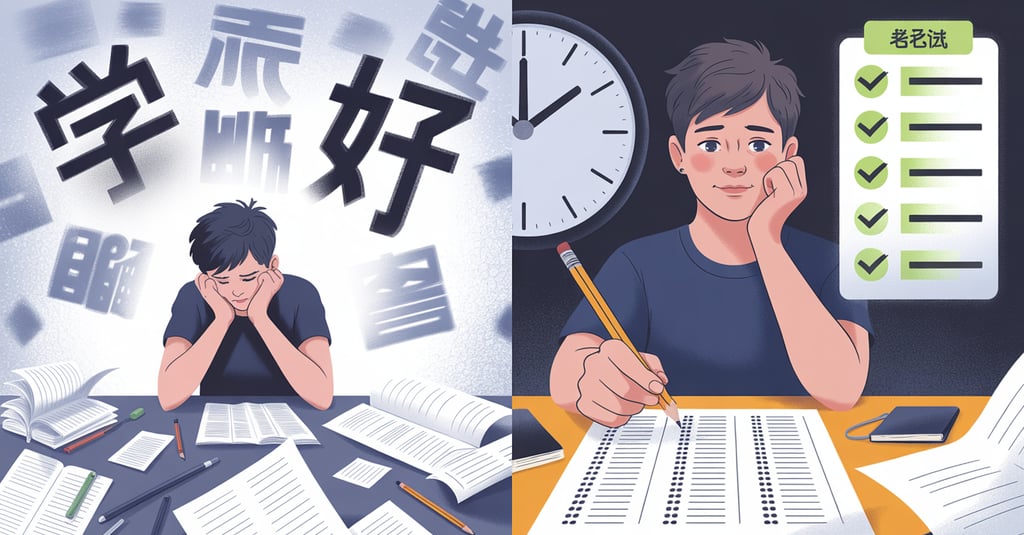SEN Specialists : Special Needs Tutors | GCSE - IGCSE Tuition |
Exam Technique: Cracking the IGCSE & GCSE Mark Schemes
Discover proven exam techniques to crack IGCSE & GCSE Mandarin mark schemes. Learn strategies for listening, speaking, reading, and writing to boost scores and think like an examiner.
James


Ni hao! 👋 I’m Ren Dee, your bilingual Mandarin and English tutor. In my last post, I broke down my methodology for building a solid foundation in Mandarin. Today, I’ll go one step further: exam technique — the secret ingredient that turns good Mandarin learners into high-scoring candidates.
Many students know vocabulary and grammar but still lose marks because they don’t understand how examiners think. The good news? Exam technique can be trained, just like tones or writing characters.
Why Exam Technique Matters?
Examiners aren’t simply asking, “Does the student know Mandarin?” They’re following strict mark schemes. If you don’t align with the expectations of the exam board (Cambridge, Edexcel, AQA), you risk leaving easy marks on the table.
I often see students:
Write long, wonderful answers… but forget the required number of points.
Panic in the speaking exam, giving one-word replies.
Struggle with timings, leaving answers unfinished.
That’s where exam technique coaching comes in.
Listening Paper: Active Strategies
The listening paper can feel intimidating, especially with fast audio. Here’s how I train my students:
Anticipate the question – Highlight keywords before the audio plays.
Note technique – Quick jotting of characters or pinyin to capture ideas.
Pattern spotting – Recognising question “types” that often reappear.
Top Tip: Don’t try to translate every word in your head. Listen for meaning chunks instead.
Speaking Paper: Structure Meets Confidence
For many learners, this is the scariest part. My coaching focuses on building structure and confidence:
Roleplay practice – Familiarise with common exam scenarios.
Structured replies – Teach students how to expand beyond “yes/no” by adding opinions and reasons.
Mock examiner drills – Simulate the exam setting to reduce real exam nerves.
Top Tip: Even if you’re unsure, never stay silent. Reframe or extend your answer — examiners reward communication.
Reading Paper: Accuracy Over Speed
The temptation is to rush, but marks are lost when students skim-read Mandarin characters too quickly. Strategies:
Scan for context clues – Radicals, familiar phrases, or repeated words unlock meaning.
Identify question style – Each requires a different approach.
Grammar alerts – Pay attention to particles like 了, 过, 在 — they change meaning dramatically.
Writing Paper: Elevating the Essay
Writing is where careful planning pays off. I coach students to:
Plan quickly – Write a bullet-point outline before diving in.
Variety of structures – Use connectives, rhetorical questions, and complex phrases.
Accuracy before flair – A clear, correct sentence scores more than a confusing one.
Character confidence – Focus on legibility and correct usage.
Top Tip: Memorise “building block” sentences that fit almost any topic.
Time Management Secrets
Across all exam papers, I teach time-awareness drills. Students practise under timed conditions until it feels natural.
Listening – Quick notes, not full sentences.
Reading – Allocate marks per minute.
Writing – Always leave 3–5 minutes for proof-checking characters.
Thinking Like an Examiner
The breakthrough moment comes when students start reading questions like examiners:
Ask yourself: “What does this question actually test?”
Use mark schemes from past papers to spot where marks are awarded.
Practise writing model answers and comparing them against real examiner feedback.
Final Thoughts
Exam success in IGCSE & GCSE Mandarin isn’t just about studying harder — it’s about studying smarter. With the right strategies, students can turn their knowledge into high, reliable scores, avoiding small mistakes that cost big marks.
In my next blog, I’ll cover Pronunciation: Sounding Natural in Mandarin, where I’ll share techniques for mastering tones and clarity so students stand out in oral exams.
📩 If you want tailored exam coaching that goes beyond textbooks, get in touch — I’ll show you how to think like an examiner and perform with confidence.
About
Tailored educational support for unique learning needs in Singapore, UK, Malaysia, Philippines, Indonesia, Thailand, Laos, Cambodia & China.
EDUCATION FOR HEALTH UK (EFH) 2025. Copyright . All rights reserved.
Pages
Support Pages
What Next After GCSE and A Level or IB ?
